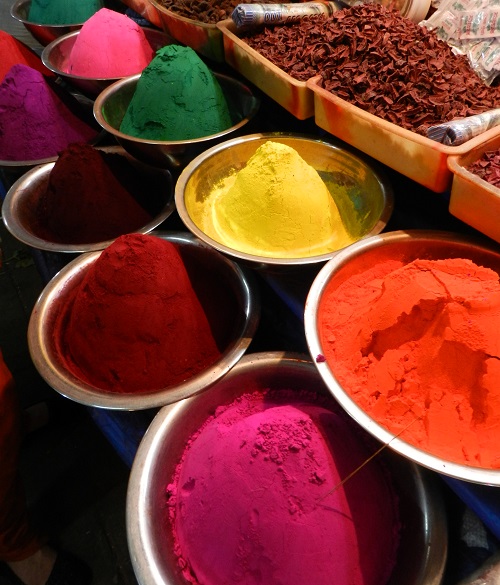FWP:
SETS == A,B
GRANDIOSITY: {5,3}
TAMASHA: {8,1}
For background see S. R. Faruqi's choices. This verse is NOT one of his choices; I thought it was interesting and have added it myself. For more on Ghalib's unpublished verses, see the discussion in {4,8x}.
The 'shame/honor' duality of naamuus (see the definition above) and related words is discussed in {3,5}.
The 'A,B' structure of the second line is irresistibly provocative-- how does the first clause connect to the second? The two clauses might simply depict opposite situations: the subtle suffering of the lover's inner world, contrasted with the crude physical colorfulness of the bazaar. Or they might in fact be parallel situations: the lover's life-breath is bloody red, while the bazaar is full of blazing colors, especially reds.
My own favorite reading is a cause-and-effect one: the lover's breath would turn (or be turned) to blood in the seclusion of the beloved's street; and as a consequence, the public bazaar would be full of color. This is a grandiose mystical effect-- the lover's inner passion is the real energy source that enlivens the whole outer, physical world. Perhaps without his passion, the bazaar would be pallid and drab, or might not even be able to exist at all. Compare the even more grandiose (and more enjoyably structured) {62,8}.
The relationship of aa))ii;N to the rest of the verse is really rather obscure; this seems a significant weakness.

Asi:
Alas, what a Doomsday it is, what a spectacle it is-- that the laws and rules of the world have made my honor of faithfulness disgraced! What the hell, is there any limit to this disgrace, and is there any end to this cruelty? --that I was slain in your street, and my blood was shed in your lane, and through this the whole bazaar is becoming colorful! It's a verse for practice/training [riyaa.z].
== Asi, p. 265